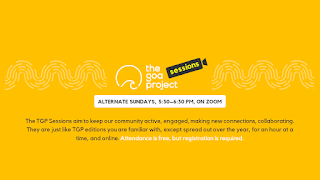The day just past marked a year since my last day at The Hindu.
This day last year marked the beginning of a week spent on the first actual holiday I’d had in eleven years, just sleeping a lot, reading, being self-indulgent. A week later, I began working on a proposal for some linked non-profit projects I’d been putting aside for years, and a plan for a book project I could do alongside. This was going to be the start of a year of self-discovery, of indulging myself by doing work I wanted to, and to hell with the money, doing just a bit of pay-the-bills work on the way.
But life, as it often does, had other plans. Like death. Dad, the last member of my immediate family got ill, two months were spent between hospital and home and then a sickbed, then he died.
Suddenly I was living completely alone. Suddenly, my life decisions would affect no one but me.
And I was paralysed by freedom.
Weeks went by when I could do nothing except walk every day, a couple of kilometres every day at first, slowly ramping up to 15. And then a health scare that made me pause. And made me pay closer attention to stories I’d been reading about a city called Wuhan and an epidemic of serious disease that then seemed to leap to an area called Lombardy. It seemed inevitable then that the contagion would reach us sooner rather than later. I stocked my kitchen and locked down before the thaalis and taalis.
And so nine months have passed, baby.
I had to put the projects and the book plan aside (they all needed me to travel). The kind of jobs I wanted were getting scarcer; many I know lost employment that seemed secure, and there was no freelance on offer. My health has been up and down.
But, you know what? It’s not been a wasted year.
For one, low phases aside, I’m healthy, net net. (And three Coronavirus tests came out negative.)
Thanks to once having been too broke to pay hospital bills, I had saved madly for medical emergencies I thought would come. Instead, I wound up prepared for the truly unforeseen, with savings to pay rent in the quiet neighbourhood I live in (and a landlord, bless his usually miserly heart, who hasn’t raised it, though he was contractually entitled to). I was in a godawful mental slump a few months, and I pulled myself together with this thought.
I learnt, thanks to the generosity of many of you, and a group I started, how to feed myself better, more nutritiously, with more variety, with stuff I had never encountered before. And with less waste. (Peels and scraps and bones and such are frozen, then made into stock; all remnants are composted; the only waste I generate is packaging from food, and that is one dustbinful a month.) In the time to come when we can visit each other, I won’t be famous for my dinner parties, but I’ll invite you to stay for a meal without embarrassment.
And I helped start and run two other projects that were not even on my horizon nine months ago.
Thanks to being able to afford that quiet neighbourhood (and male privilege) I was able to walk every night. I haven’t been able to do any art or poetry, strangely, but I’m not too worried about that; those things come when they come; when they do, I’ll be there.
My closest friends are still my closest friends, we talk more than we did before (though I’d also like to hug them, and that will have to wait). Friends who’d been too busy to keep in touch — more likely, truth be told, I’d been too busy or worked hours too weird to keep in touch with them — were chatting again. Some folks I knew only slightly have now become close too. Together, we talked each other through this weird reality we find ourselves in, across the world, sharing stories, sharing memories, sharing hopes.
No, not a wonderful year, but yes, a wonderful year.


